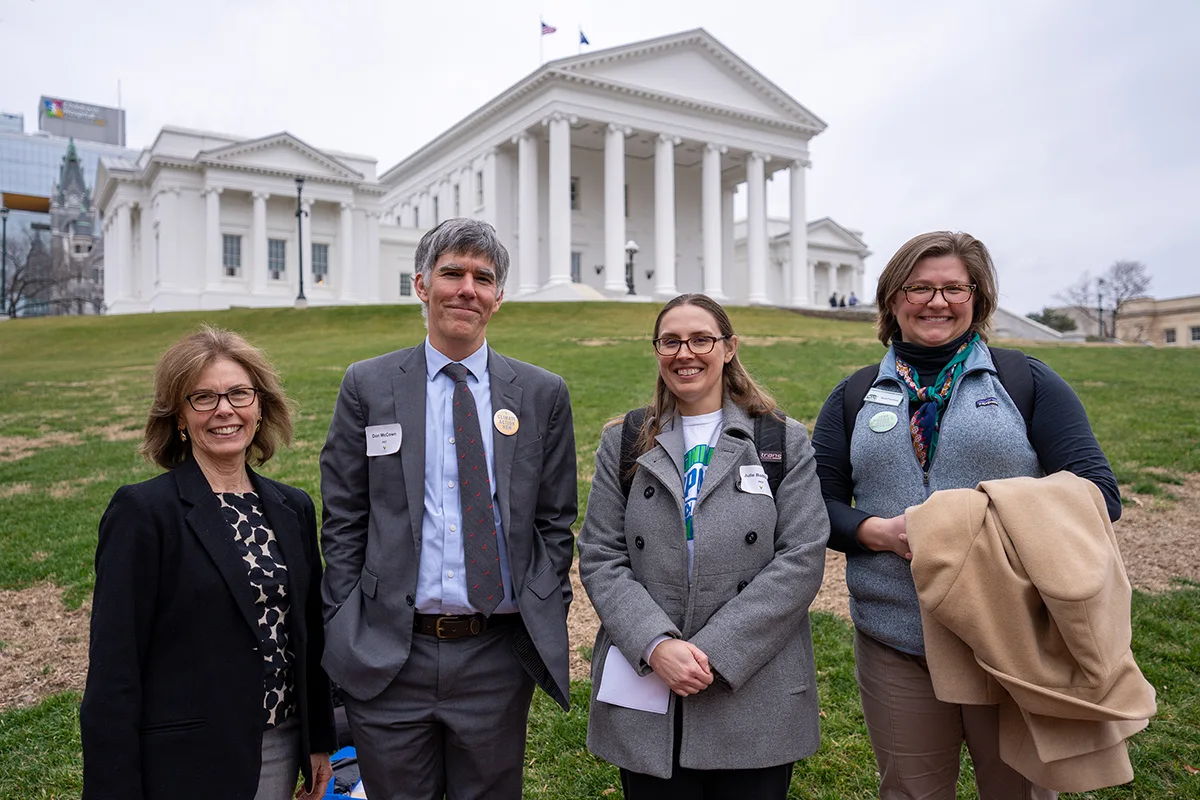Dear Friends,
For more than 50 years, PEC has advocated that local governments, state agencies and communities plan together for long-term sustainability with a thoughtful balance between development and conservation.
As a result of PEC’s advocacy for a holistic approach: land use decisions and proposals in Virginia now take into account effects on the state’s transportation systems; state and local policies identify lands with public benefits and offer incentives for conserving those lands; and the Virginia Piedmont has become a national model of public and private conservation. In just the past year, we’ve accelerated conservation efforts with an eye toward large connected areas of protected lands to help meet local, state, and national goals for water quality, farm soils, biodiversity, and carbon sequestration.
If you’ve been following PEC over the past 18 months or so, you can’t help but have noticed a consistent theme: all of this positive momentum is at risk of being overrun by the rise of one industry — data centers.
In areas where data centers are concentrating, years of successful efforts to reduce overall energy consumption by encouraging investment in energy efficiency are being dramatically offset by a peak electrical demand in Virginia now projected to double (or more) by 2040. That demand increase comes with lasting impacts to local communities and ratepayers and to the climate, our air and water, our wildlife, and our natural, cultural and historic resources. New power has to come from somewhere. It has to be generated and it has to travel from source to sink via our electric grid and transmission lines. The impact could be spread over hundreds of thousands of acres and communities far from where the demand is being generated.
The notion that we can provide all of this power entirely from renewable sources and also on the timeline the data center industry is demanding it, is unrealistic. Already, FirstEnergy Corp. has announced it will postpone retiring its Fort Martin and Harrison coal-fired power plants in West Virginia. Here in the Commonwealth, Dominion Energy is pursuing a major new natural gas facility in Chesterfield and openly questioning whether fossil-fuel retirements can proceed on time. As important, under current laws and regulation in place in Virginia, the costs of rapid expansion of energy generation and transmission will be borne by ratepayers through electrical bills projected to double over the next 15 years. And right now, investor-owned utilities are seeking profit guarantees related to the development of small modular nuclear reactors – an unproven technology – at ratepayer expense, even if these plants are never completed or never generate electricity for their customers.
Virginia committed in 2020 to an ambitious goal for renewable energy, which PEC supports. When it comes to solar, the state is making tremendous progress toward the goals of the Virginia Clean Economy Act, which requires development of 16,100 megawatts of solar and onshore wind by 2035. According to the Virginia Association of Counties, over 11,000 megawatts of utility-scale solar projects have been approved, more than two-thirds of the way toward meeting that goal.

However, the energy demands of the data center industry are moving the goalposts, and in doing so, impeding progress on a green-energy future built to serve our homes, local businesses, transit and vehicles. Dominion Energy’s Integrated Resource Plan submitted in May 2023 asserted that the demand from data centers could not be satisfied by the framework set out in the Virginia Clean Energy Act and recommended continued operation of existing natural gas plants, construction of new gas plants, massive investment in small modular reactors, and transmission that connects to coal and other fossil fuel generation outside of Virginia.
Meanwhile, there seems to be little-to-no appetite for hard conversations about the need for careful planning and siting of data centers, about their potential energy usage, or about the importance of best practices and community engagement. Similarly, there is a reluctance to support the regulation and mitigation of impacts of energy infrastructure. In 2022, PEC advocated for legislation that set a path toward reasonable mitigation for utility-scale solar. More recently, we supported legislation to study and regulate the effects of data centers. Unfortunately, we also saw legislation to fast track approvals and reduce local government authority over land-use decisions. Ultimately, PEC continues to advance the idea that more attention — not less — should be given to mitigating unavoidable negative impacts.
Hundreds of billions of dollars worth of investment are expected due to this data center expansion. If even 10% of that were set aside upfront for mitigation, Virginia could make a substantial commitment to offsetting the impacts on nature, public health, and communities, to ensure we continue moving toward Virginia’s climate goals without sacrificing our collective great strides in conservation, water quality, and carbon sequestration. It’s time for our residents and elected leaders to demand more from the data center industry. And we should consider removing tax breaks on computer equipment and other incentives without meaningful requirements for energy efficiency, reduction of water consumption and measures to reduce noise and other neighborhood-level concerns.
A lot of learning has taken place over the last three years. Now it’s time to demand greater transparency, greater accountability and greater investment in what makes Virginia special. While there is still time.
Sincerely,
Chris Miller, President
This letter appeared in the 2024 spring edition of The Piedmont Environmental Council’s member newsletter, The Piedmont View. If you’d like to become a PEC member or renew your membership, please visit pecva.org/join.
